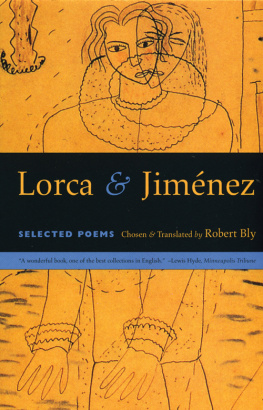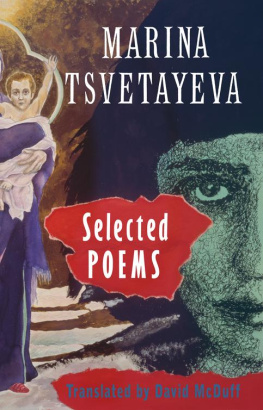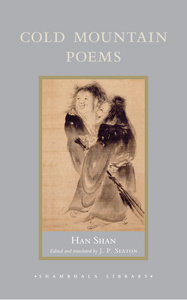Bly - Lorca and Jiménez: selected poems
Here you can read online Bly - Lorca and Jiménez: selected poems full text of the book (entire story) in english for free. Download pdf and epub, get meaning, cover and reviews about this ebook. City: Boston, year: 1997, publisher: Beacon Press, genre: Detective and thriller. Description of the work, (preface) as well as reviews are available. Best literature library LitArk.com created for fans of good reading and offers a wide selection of genres:
Romance novel
Science fiction
Adventure
Detective
Science
History
Home and family
Prose
Art
Politics
Computer
Non-fiction
Religion
Business
Children
Humor
Choose a favorite category and find really read worthwhile books. Enjoy immersion in the world of imagination, feel the emotions of the characters or learn something new for yourself, make an fascinating discovery.
- Book:Lorca and Jiménez: selected poems
- Author:
- Publisher:Beacon Press
- Genre:
- Year:1997
- City:Boston
- Rating:3 / 5
- Favourites:Add to favourites
- Your mark:
- 60
- 1
- 2
- 3
- 4
- 5
Lorca and Jiménez: selected poems: summary, description and annotation
We offer to read an annotation, description, summary or preface (depends on what the author of the book "Lorca and Jiménez: selected poems" wrote himself). If you haven't found the necessary information about the book — write in the comments, we will try to find it.
Bly: author's other books
Who wrote Lorca and Jiménez: selected poems? Find out the surname, the name of the author of the book and a list of all author's works by series.
Lorca and Jiménez: selected poems — read online for free the complete book (whole text) full work
Below is the text of the book, divided by pages. System saving the place of the last page read, allows you to conveniently read the book "Lorca and Jiménez: selected poems" online for free, without having to search again every time where you left off. Put a bookmark, and you can go to the page where you finished reading at any time.
Font size:
Interval:
Bookmark:


A longing for what could never be achieved had not yet been dismissed. Lorcas poetry, as we know, revealed the coming agonies of the Spanish Civil War and the existing agony of industrialism, and his poems written in New York in 1929 are still the greatest poems ever written about our horrendous national city. He said: There is a wire stretched from the Sphinx to a safety deposit box that passes through the heart of all poor children. In these lines we are looking straight at what was later to be called welfare reform. The poetry he wrote in A Poet in New York is rough and prophetic, more than any poetry we have now, but the inner delicacy out of which the poetry came is even more distant from our contemporary spiritual mood, which is so diminished by pop culture. Lorca could be speaking to many contemporary professors and poets when he says, The leaves of the roses fall in the mud.
Oh sweet John of God! What do you see in these magnificent petals? Your heart is tiny! Medieval Arabic poetry infuses Lorcas images, but his spiritual father was Juan Ramn Jimnez. Jimnezs love of silence, his love of perfection, was famous in Madrid. To keep his solitude, he would answer his own house telephone, Juan Ramn is not at home today. He said: True music is the music of silence, the silent but well-heard music of thought in the head, passion in the body, reverie in the soul. Translated by
Christopher Maurer He wrote: Who knows what is going on on the other side of each hour?... I was thinking of a flowery meadow at the end of a road, and found myself in the slough.
I was thinking of the greatness of what was human, and found myself in the divine. If we read Lorca and Jimnez carefully, we can sense the subtle nature of the soul-ground out of which prophetic poetry rises. It is a ground cultivated in silence behind garden walls, shrewdly protected, loving the perfections of high art, an art that fights for the values of reverie, the feminine, and the spirit. Juan Ramn reminds us of our sadness: Mob of beings and things! A true sadness, because you are really deep in the soul, as they say, not in time at all! R OBERT B LY Selected Poems of
JUAN RAMN JIMNEZ
Juan Ramn Jimnez vision of poetry is very different from that of Neruda or Trakl. Neruda and Trakl take all their weight as men, and put that into their poems. Their love goes out as a form of occult energy into boulders, river barges, crumbling walls, dining rooms, womens clothes. When they step back, they leave the energy there. Their poems lie there separate from them, massive, full of grief. To Jimnez writing a poem means something entirely different.
For him a poem has ecstasy: that is the difference between poetry and prose. Living as a poet means feeling that ecstasy every day of your life, every hour if possible. A poem flies out of the poet like a spark. Whatever the poet writes down will be touched with ecstasythe poem will therefore be light, not light in the sense of light verse that avoids seriousness, but light as a spark or as an angel is light. With one or two fewer words the poem would leap straight up into the sky. The heavy poems of Trakl lie brooding in alleys or on mountain tops, and when the reader walks up to them they hardly notice him: they feel too great a sorrow.
Jimnez poems on the other hand are nervous and alert, and when we come near, they see us, they are more interested in us than in themselvesthey try to show us the road back to the original ecstasy. The poems are signposts pointing the reader back to the poet, that is, back toward the life from which the ecstasy came. Juan Ramn Jimnez said that he lived his life in such a way as to get the most poetry possible out of it, and he loved solitude, private gardens, cloisters, silent women with large eyes. Jimnez poems ask the question: what sort of life shall we live so as to feel poetry, ecstasy? His emphasis on how the poet lived, rather than on rhythm or technique, is precisely why so much poetry flowed from him into the young poets. In his life he embodied as Yeats did some truth about poetry that everyone, but especially poetry professors, try to ignore and do ignore. II We can understand the subject matter of Jimnez poems if we understand that it is in solitude a mans emotions become very clear to him.
Jimnez does not write of politics or religious doctrines, of the mistakes of others, not of his own troubles or even his own opinions, but only of solitude, and the strange experiences and the strange joy that come to a man in solitude. His books usually consist of emotion after emotion called out with great force and delicacy, and it must be said that his short, precise poems make our tradition of the long egotistic ode look rather absurd. Seeing the beauty of a sunset, for instance, he does not, with many stanzas, complicated syntax, and involved thoughts, write a long elaborate ode on immortalityhe simply says: Serene last evening, short as a life, end of all that was loved, I want to be eternal! Translated byCarlos Francisco de Zea This is what he calls naked poetry. It is poetry near the emotion. He has a wonderful poem in which he says that, in his youth, when poetry first came to him, she came to him like a very young girl, naked, and he loved her. Then, later, she began to put on ornaments and become very elaborate, and he began to hate her, without knowing why.
Then, years later, she began to trust him, and now, at last is a young girl, naked, againnaked poetry, that I have loved my whole life! III Jimnez, as a poet, was born in the great and joyful reviving of Spanish poetry about 1905, led by Antonio Machado, Unamuno, and himself, who all dreamed of a new blossoming of Spain. Jimnez was not robust. He was delicate, neurasthenic, and slipped off into insanity more than once. Yet his devotion to poetry was healthy and rigorous. He was more generous to younger poets than Yeats was; he spent years editing poetry magazines and starting publishing ventures to get poets in print, endless afternoons poring over young poets manuscripts. His delight and Machados stubbornness prepared the way for the great generation of 28: Lorca, Aleixandre, Salinas, Guilln.
Font size:
Interval:
Bookmark:
Similar books «Lorca and Jiménez: selected poems»
Look at similar books to Lorca and Jiménez: selected poems. We have selected literature similar in name and meaning in the hope of providing readers with more options to find new, interesting, not yet read works.
Discussion, reviews of the book Lorca and Jiménez: selected poems and just readers' own opinions. Leave your comments, write what you think about the work, its meaning or the main characters. Specify what exactly you liked and what you didn't like, and why you think so.

